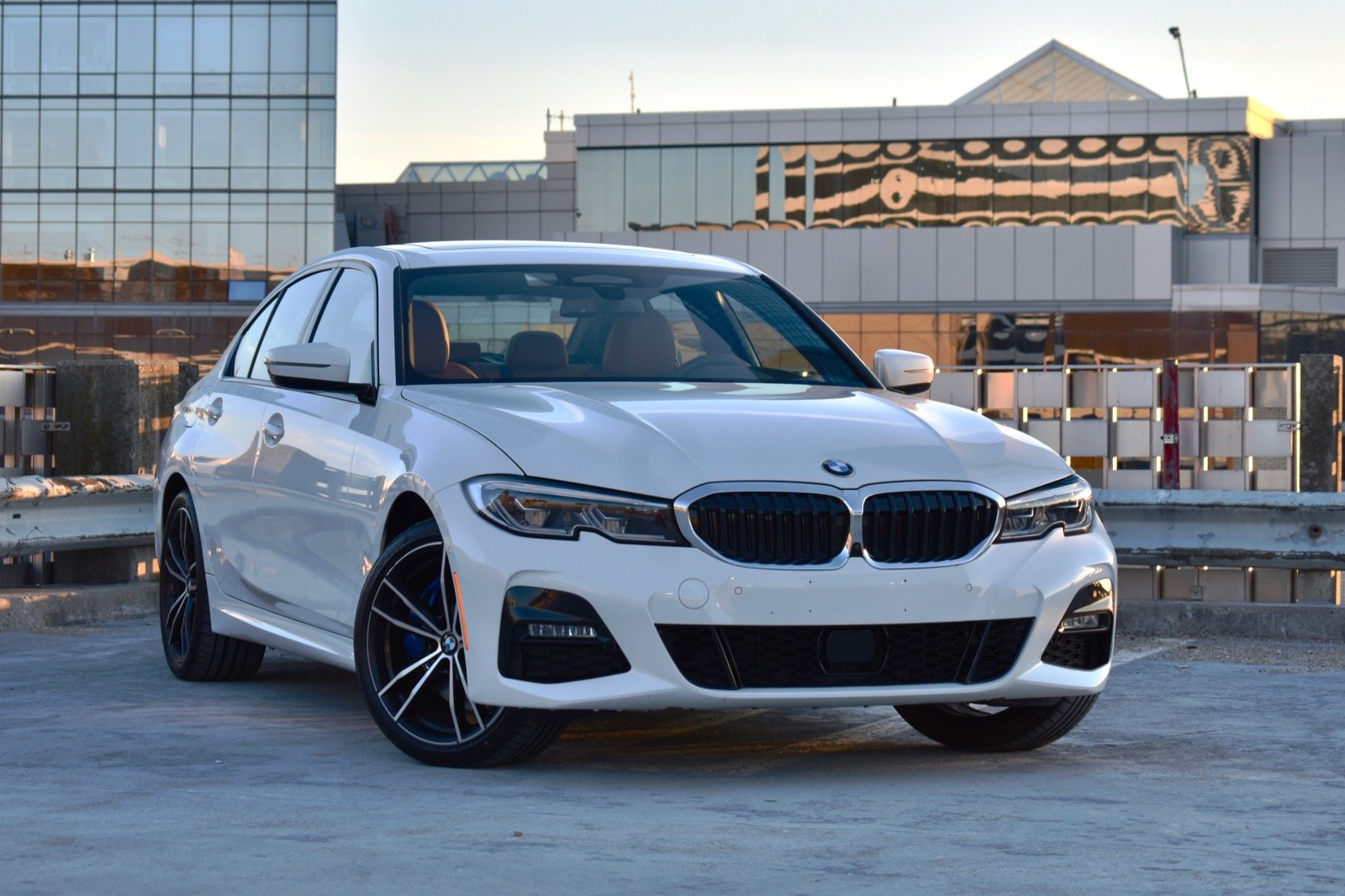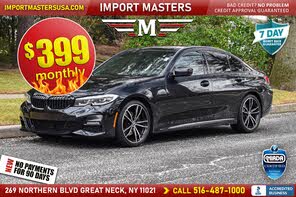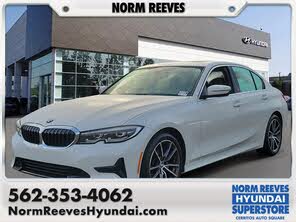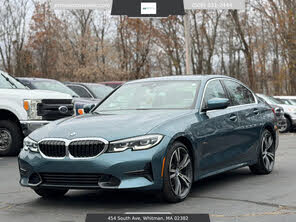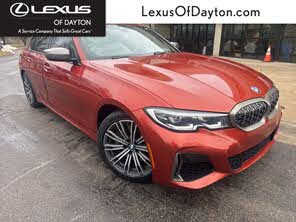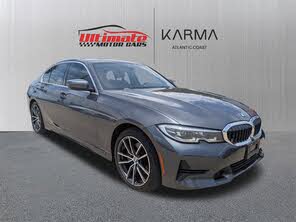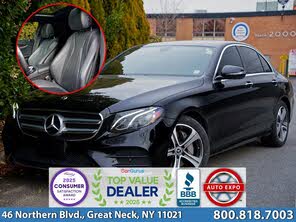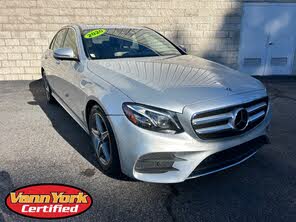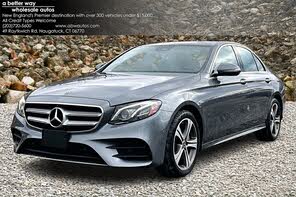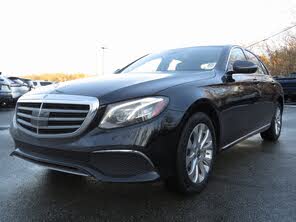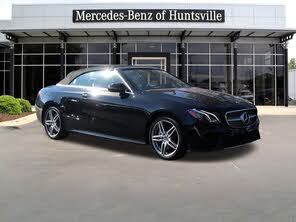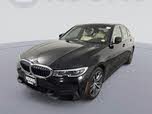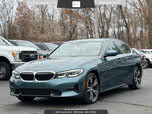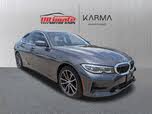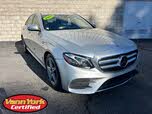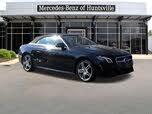2021 BMW 3 Series vs 2020 Mercedes-Benz E-Class
Overview | |
MSRP$54,050 | MSRP$41,250 |
Listings261 | Listings565 |
Ratings & Reviews | |
User Reviews | User Reviews |
Expert reviews8.0 out of 10 | Expert reviews6.8 out of 10 |
Pros
Cons
| Pros
Cons
|
2020 Mercedes-Benz E-Class Reviews SummaryA Mercedes-Benz is a physical indulgence that gives as much or as little pleasure as your checking account allows. The 2020 E-Class starts off well-equipped in ways a $55,000 Mercedes wasn't just a few years ago, and it becomes decadent and power-drunk once you start adding options. For 2020, a new base engine joins this car's stellar design, technology, and effortless demeanor. | |
2021 BMW 3 Series Reviews SummaryEarly generations of the BMW 3 Series redefined what a luxury car could be, justifying their prestige badge with sporty driving dynamics and impeccable engineering. BMW changed the luxury-car paradigm, proving that nimble sports sedans could be just as desirable as wood-encrusted land yachts. The 3 Series spawned a number of imitators, including the Audi A4, Mercedes-Benz C-Class, and Lexus IS. Those sedans, along with the Acura TLX, Alfa Romeo Giulia, Cadillac CT4, and Infiniti Q50 (which wear more recently-introduced nameplates) still form the 3 Series’ competitive set, but the car itself has changed. Introduced for the 2019 model year, the current-generation 3 Series (codenamed G20) feels more like a traditional luxury sedan, with a greater emphasis on comfort and convenience than previous generations. The manual transmission is gone, as are the wagon and 3 Series GT hatchback body styles. The 3 Series coupe and convertible were re-badged as the 4 Series beginning with the 2014 model year. The biggest change for the 2021 BMW 3 Series is the addition of the 330e plug-in hybrid model to the lineup, so that’s what we test drove for this review. BMW also offers 330i and M340i versions, and there’s an M3 performance model on the way. | |
No video found | |
Popular Features & Specs | |
Engine2.0L 255 hp I4 | Engine2.0L 255 hp I4 |
Drive TrainRWD | Drive TrainRWD |
Seating Capacity5 | Seating Capacity5 |
Horsepower255 hp @ 5800 rpm | Horsepower255 hp @ 5000 rpm |
MPG City23 | MPG City26 |
MPG Highway32 | MPG Highway36 |
Engine | |
Engine Name2.0L 255 hp I4 | Engine Name2.0L 255 hp I4 |
Torque273 lb-ft @ 1800 rpm | Torque295 lb-ft @ 1450 rpm |
Horsepower255 hp @ 5800 rpm | Horsepower255 hp @ 5000 rpm |
DrivetrainRWD | DrivetrainRWD |
Fuel Economy | |
MPG City23 | MPG City26 |
MPG Highway32 | MPG Highway36 |
Interior | |
Seating Capacity5 | Seating Capacity5 |
Key Features | |
Navigation SystemStandard | Navigation SystemStandard |
Sunroof/MoonroofStandard | Sunroof/MoonroofStandard |
Safety | |
Front Crash Overall5 | Front Crash Overall5 |
Side Crash Overall5 | Side Crash Overall5 |
Dimensions & Capacity | |
Cargo Space13.1 cu ft | Cargo Space13.0 cu ft |
Curb Weight3814 lbs | Curb Weight3589 lbs |
Height57.8 in | Height56.8 in |
Length193.8 in | Length185.7 in |
Width81.3 in | Width81.4 in |
Wheelbase115.7 in | Wheelbase112.2 in |
Number of doors4 | Number of doors4 |
Overview | ||
MSRP | $54,050 | $41,250 |
Listings | ||
Ratings & Reviews | ||
User reviews | ||
Expert reviews | 8.0 out of 10Read full review | 6.8 out of 10Read full review |
Pros & cons | Pros
Cons
| Pros
Cons
|
Summary | A Mercedes-Benz is a physical indulgence that gives as much or as little pleasure as your checking account allows. The 2020 E-Class starts off well-equipped in ways a $55,000 Mercedes wasn't just a few years ago, and it becomes decadent and power-drunk once you start adding options. For 2020, a new base engine joins this car's stellar design, technology, and effortless demeanor. | Early generations of the BMW 3 Series redefined what a luxury car could be, justifying their prestige badge with sporty driving dynamics and impeccable engineering. BMW changed the luxury-car paradigm, proving that nimble sports sedans could be just as desirable as wood-encrusted land yachts. The 3 Series spawned a number of imitators, including the Audi A4, Mercedes-Benz C-Class, and Lexus IS. Those sedans, along with the Acura TLX, Alfa Romeo Giulia, Cadillac CT4, and Infiniti Q50 (which wear more recently-introduced nameplates) still form the 3 Series’ competitive set, but the car itself has changed. Introduced for the 2019 model year, the current-generation 3 Series (codenamed G20) feels more like a traditional luxury sedan, with a greater emphasis on comfort and convenience than previous generations. The manual transmission is gone, as are the wagon and 3 Series GT hatchback body styles. The 3 Series coupe and convertible were re-badged as the 4 Series beginning with the 2014 model year. The biggest change for the 2021 BMW 3 Series is the addition of the 330e plug-in hybrid model to the lineup, so that’s what we test drove for this review. BMW also offers 330i and M340i versions, and there’s an M3 performance model on the way. |
Video | No video found | |
Popular Features & Specs | ||
Engine | 2.0L 255 hp I4 | 2.0L 255 hp I4 |
Drive Train | RWD | RWD |
Seating Capacity | 5 | 5 |
Horsepower | 255 hp @ 5800 rpm | 255 hp @ 5000 rpm |
MPG City | 23 | 26 |
MPG Highway | 32 | 36 |
Engine | ||
Engine Name | 2.0L 255 hp I4 | 2.0L 255 hp I4 |
Torque | 273 lb-ft @ 1800 rpm | 295 lb-ft @ 1450 rpm |
Horsepower | 255 hp @ 5800 rpm | 255 hp @ 5000 rpm |
Drivetrain | RWD | RWD |
Fuel Economy | ||
MPG City | 23 | 26 |
MPG Highway | 32 | 36 |
Interior | ||
Seating Capacity | 5 | 5 |
Key Features | ||
Navigation System | Standard | Standard |
Sunroof/Moonroof | Standard | Standard |
Safety | ||
Front Crash Overall | 5 | 5 |
Side Crash Overall | 5 | 5 |
Dimensions & Capacity | ||
Cargo Space | 13.1 cu ft | 13.0 cu ft |
Curb Weight | 3814 lbs | 3589 lbs |
Height | 57.8 in | 56.8 in |
Length | 193.8 in | 185.7 in |
Width | 81.3 in | 81.4 in |
Wheelbase | 115.7 in | 112.2 in |
Number of doors | 4 | 4 |
The 2020 Mercedes-Benz E-Class, introduced in 2017, featured a rounded, smooth body reminiscent of the E-Class from two generations prior. While some critics felt it was overly streamlined, the design was still recognizable within the Mercedes-Benz family, resembling both the larger S-Class and smaller C-Class. Available in sedan, wagon, coupe, or cabriolet forms, the E-Class catered to conservative buyers who appreciated its unshowy nature. The sedan, in particular, looked especially rich with its hood ornament and thin-laced chrome grille, a nod to Mercedes tradition. LED lighting added a delicate touch, and the car's proportions were visually appealing across various models, from the Luxury model's higher-riding suspension on 17-inch wheels to the sportier versions on 20-inch wheels with ground effects and quad exhausts.
The cabriolet version of the E-Class particularly benefited from the fluid, creaseless form, with the contrasting soft top revealing a sumptuous interior. The interior, when specified correctly, featured multi-tone leathers, aluminum, and deep-polished wood, creating a luxurious environment. Two feet of high-resolution digital screens stretched across the dash, complemented by four circular air vents and a row of knurled silver toggles for climate control. The ambient lighting, available in 64 colors with various animations, added to the car's appeal. Even the base model, with leatherette and standard seats, felt a cut above other cars in its segment.
The 2021 BMW 3 Series returned to a traditional familial look, resembling a smaller version of the 5 Series and 7 Series sedans. However, while the classic E30 3 Series became a design icon, the G20 3 Series appeared stuffy. The large, oddly-shaped grille looked fine on the larger 5 Series but seemed out of place on the smaller sedan. Besides the grille and headlights, which referenced older models' "halo" lights, there wasn't much distinctive about the design. Most customers likely cared more about the badge on the hood.
Our test car featured M 19-inch wheels and blue-painted brake calipers, part of the optional M Sport trim package. The standard Sport Line trim package for the 330e and 330i included 18-inch wheels with a different design. The interior had a nice design but was let down by unimpressive materials. Our test car had as much plastic trim as a basic economy car, with Ash wood trim that looked fake. Leather upholstery was an optional extra, with synthetic Sensatec material as standard. The optional M heated steering wheel looked out of place in the otherwise conservatively styled interior.


















The 2020 Mercedes-Benz E-Class offered a range of powertrains, starting with the E350, which replaced the E300. The E350 featured a turbocharged 2.0-liter 4-cylinder engine producing 255 horsepower and 273 pound-feet of torque, paired with a 9-speed automatic transmission. The revised turbo with a twin-scroll design and shorter intake runners provided quicker response, although the car's performance above 40 mph was underwhelming. The E450, with a 3.0-liter V6 engine producing 362 horsepower and 369 pound-feet of torque, offered a more balanced and powerful driving experience. The AMG E53, with a hybrid setup, produced 429 horsepower and 384 pound-feet of torque, while the AMG E63 S, with a 4.0-liter twin-turbo V8, delivered 603 horsepower and 627 pound-feet of torque. Fuel economy varied between 19 to 32 mpg, depending on the powertrain and body style.
The 2021 BMW 3 Series offered three powertrains: the base 330i with a 2.0-liter turbocharged four-cylinder engine producing 255 horsepower and 295 pound-feet of torque, the 330e plug-in hybrid with a combined output of 288 horsepower and 310 pound-feet of torque, and the M340i with a turbo inline-six engine producing 382 horsepower and 369 pound-feet of torque. All powertrains were available with rear-wheel drive or xDrive all-wheel drive, paired with an eight-speed automatic transmission. The M340i could accelerate from 0 to 60 mph in 4.2 seconds, while the base 330i took 5.6 seconds. The 330e matched the 330i's acceleration time despite its extra weight, but the transition from electric to gasoline power was clunky. The 3 Series offered a comfortable highway ride and excellent handling, but it lacked the engaging driving experience of past models.
The 2020 Mercedes-Benz E-Class featured a complicated COMAND infotainment system, which could be unwieldy on the car's large screens. The lack of touchscreens was a significant drawback, making it difficult to change audio settings, switch sources, adjust ambient lighting, and input addresses while driving. The system required familiarity with Mercedes models to navigate effectively. However, the E-Class offered functional features like seat and seat climate controls on the door panels, ample space in every dimension, and clear sightlines. The coupe had a usable rear seat, and the wagon included a rear-facing jump seat for small children. The car also featured a net in the front passenger footwell for securing water bottles.
The 2021 BMW 3 Series provided better interior space than most small luxury sedans, with the best rear headroom in the segment and above-average front headroom. Legroom was average, and shoulder room was less generous than the Acura TLX. Gasoline models offered 17 cubic feet of cargo space, while the 330e plug-in hybrid's battery pack reduced trunk space to 13.2 cubic feet. The trunk's long-and-narrow shape required an awkward reach to maximize space, but a 40/20/40 split-folding rear seat was standard. The 3 Series cockpit was well-designed, with a touchscreen positioned for easy reach and good outward visibility.
The 2020 Mercedes-Benz E-Class featured advanced technology, including a semi-automated driving system that could steer itself, help steer around obstacles, change lanes, slow down for curves, and sense people and objects from various directions. The Driver Assistance Package included these features. Other tech-forward features included a V2X system for communication with nearby Mercedes models, customizable digital dash designs, Bluetooth connectivity, Apple CarPlay, and Android Auto. The Burmester stereo offered surround-sound modes, and the front camera activated automatically when approaching a space. Some features, like the Energizing Comfort Package, were more novelty than necessity.
The 2021 BMW 3 Series came with the standard iDrive infotainment system, featuring an 8.8-inch touchscreen, Bluetooth, and USB ports. Gasoline models included Apple CarPlay and Android Auto, while the 330e only had CarPlay. The optional Live Cockpit Professional system added a digital instrument cluster and navigation, with a head-up display available. The infotainment system was user-friendly, with high-quality graphics and responsive controls. BMW provided multiple control options, including the iDrive controller, steering wheel controls, voice assistant, and gesture controls. Some features felt gimmicky, but the system offered flexibility in how to interact with it.
The 2020 Mercedes-Benz E-Class sedan and wagon received a 5-star overall rating from the National Highway Traffic Safety Administration (NHTSA) and a Top Safety Pick+ rating from the Insurance Institute for Highway Safety (IIHS). The coupe and cabriolet models were not tested but were considered equally safe. The E-Class featured innovative safety technologies, including Pre-Safe Sound, side bolster inflation during side collisions, and crosswind countermeasures. Standard safety features included forward emergency braking, driver attention monitor, and blind-spot monitoring, with additional driver-assist features available as options.
The 2021 BMW 3 Series received a Top Safety Pick award from the IIHS, with top scores in all crash tests but mixed headlight scores. The NHTSA had not published safety ratings for the 2021 model. Standard safety features included forward-collision warning, automatic emergency braking, and lane-departure warning. The optional Driving Assistant Professional Package added adaptive cruise control, lane-keep assist, automated lane centering, and other advanced features. The package also included stop-and-go functionality for adaptive cruise control and Extended Traffic Jam Assistant for slow-speed traffic.
CarGurus highlights

According to CarGurus experts, the overall rating for the 2020 Mercedes-Benz E-Class is 8.0 out of 10, while the 2021 BMW 3 Series scores 6.8 out of 10. Based on these ratings, the 2020 Mercedes-Benz E-Class is the recommended choice for its superior luxury, safety features, and overall performance.
Choose the 2021 BMW 3 Series if:
- You want a user-friendly infotainment system with multiple control options.
- You need a small luxury sedan with better-than-average interior space.
- You appreciate a well-designed cockpit that enhances the driving experience.
Choose the 2020 Mercedes-Benz E-Class if:
- You prioritize a luxurious and spacious interior with high-quality materials.
- You value advanced safety features and top safety ratings.
- You prefer a versatile vehicle available in multiple body styles.
CarGurus highlights

According to CarGurus experts, the overall rating for the 2020 Mercedes-Benz E-Class is 8.0 out of 10, while the 2021 BMW 3 Series scores 6.8 out of 10. Based on these ratings, the 2020 Mercedes-Benz E-Class is the recommended choice for its superior luxury, safety features, and overall performance.
Choose the 2021 BMW 3 Series if:
Shop Now- You want a user-friendly infotainment system with multiple control options.
- You need a small luxury sedan with better-than-average interior space.
- You appreciate a well-designed cockpit that enhances the driving experience.
Choose the 2020 Mercedes-Benz E-Class if:
Shop Now- You prioritize a luxurious and spacious interior with high-quality materials.
- You value advanced safety features and top safety ratings.
- You prefer a versatile vehicle available in multiple body styles.

By: CarGurus + AI
At CarGurus, our team of experienced automotive writers remain at the heart of our content operation, conducting hands-on car tests and writing insightful guides that are backed by years of industry experience. To complement this, we are harnessing AI to make our content offering more diverse and more helpful to shoppers than ever. To achieve this, our AI systems are based exclusively on CarGurus content, ratings and data, so that what we produce is both unique to CarGurus, and uniquely helpful to car shoppers.
